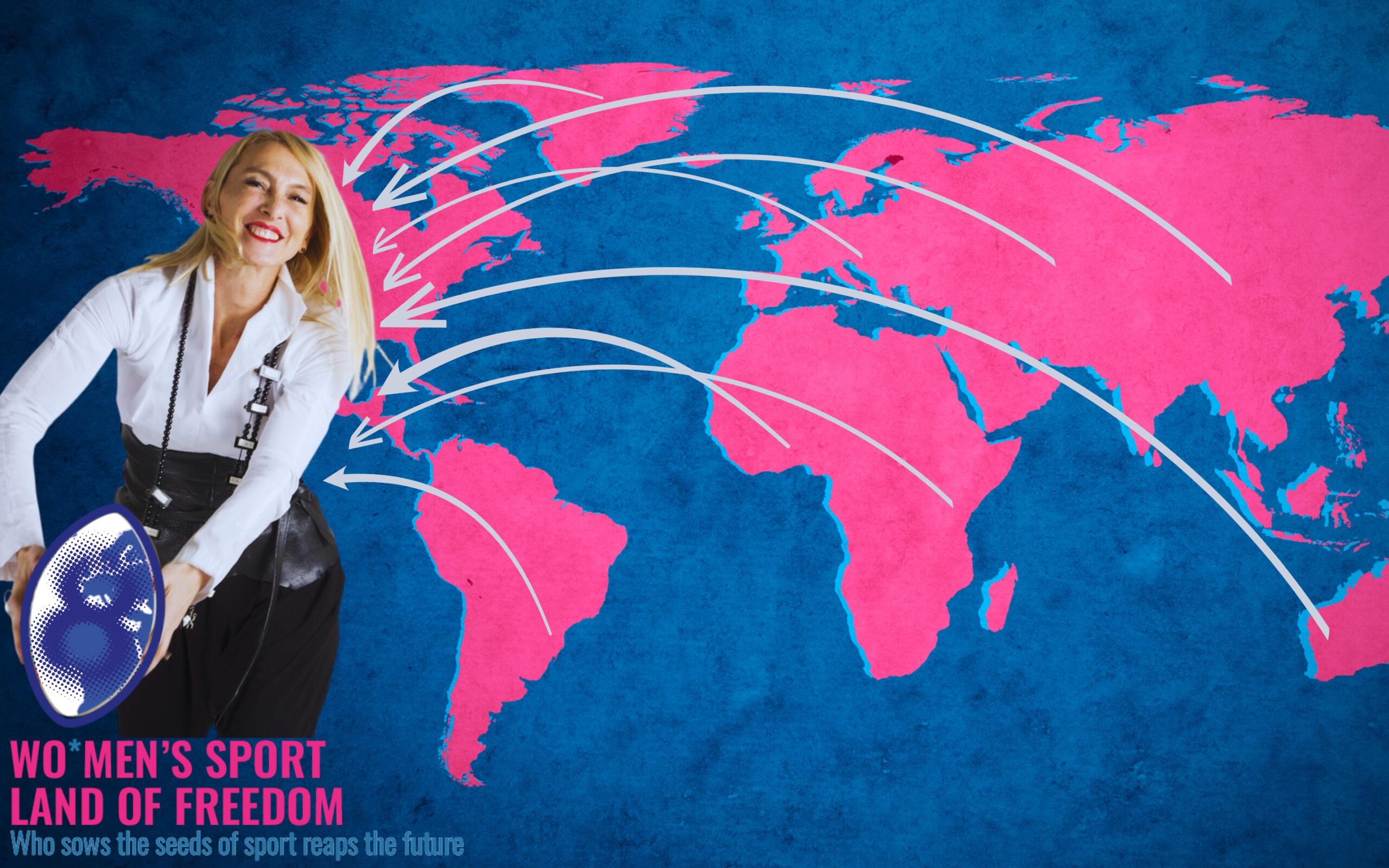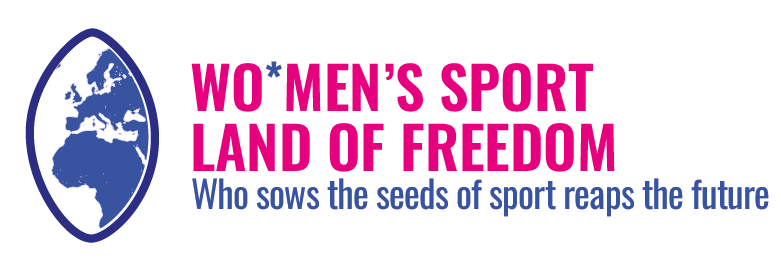
EGYPT: RUGBY GAVE ME THE CONFIDENCE TO BECOME THE PERSON I AM TODAY
“Rugby gave me the confidence to become the person I am today”

Thanks to:
Menna Sedky
Egypt’s Women Rugby Representative
- The history of the women’s movement in Egypt
- Testimonials
- Reading time: 7 minutes
EGYPT - Find out more
Egypt is a republic in North Africa with about 116.5 million inhabitants in 2024 and a slight male majority (about 49.5% women). Women hold 27.7% of parliamentary seats (February 2024). Female labor force participation is extremely low, around 18%, compared to about 73% for men—one of the largest gender gaps worldwide. This situation is amplified by heavy inequalities in unpaid domestic work and cultural and social restrictions that limit women’s access to the labor market. Significant progress has been made in education—today girls attend school at similar rates to boys, and universities graduate more women than men—but persistent barriers remain in economic and political participation.
(Source: World Bank Gender Data Portal; data.unwomen.org; TradingEconomics; data.worldbank.org; Ahram English; Washington Post; Wall Street Journal)
HISTORY OF THE COUNTRY
1. When did the women’s rugby movement start in your country and what is its history? How is rugby structured in your country?
Women’s rugby in Egypt took a significant step forward in 2019, when a structured national team was established and dedicated efforts began to develop the sport. I started communicating with the Egyptian Rugby Federation, World Rugby, and Rugby Africa, creating a detailed report on the status of women’s rugby in Egypt. Soon after, the Egyptian Rugby Federation recognized a gap in communication between Egypt and the global rugby community, which led them to appoint me as Egypt’s Women’s Rugby Representative to bridge this divide and promote the sport’s growth. Recognizing determination and perseverance, the federation supported my initiative to create the national team. With the team’s formation, women now had a clear goal to work toward, inspiring further developments at club and university levels. Our success in regional and Arab competitions helped increase the sport’s visibility, making women’s rugby more recognizable across Africa and the Arab world, fueling its expansion and creating more opportunities for athletes in Egypt. Women’s rugby in Egypt began in Cairo with the formation of a team called Cairo Rugby, initially composed mainly of expatriates living in the city. Over time, Cairo Rugby became a hub for foreign players, mixing playing styles and experiences from different countries. Later, a women’s team in Alexandria began to gain ground, attracting athletes from diverse sporting backgrounds. Since Alexandria is a smaller city, word of mouth played a fundamental role in recruitment, drawing many athletes who already excelled in other professional sports. This produced a team of highly skilled players eager to embrace the challenge of learning and excelling in rugby. The introduction of rugby in Egypt’s two most vibrant cities laid the foundations for further expansion. Universities soon showed interest, forming teams that introduced young athletes to a sport demanding both physical and mental strength. As more teams emerged, competition grew, with tournaments now extending beyond six annual events. Today, the women’s rugby scene in Egypt is not only thriving but also showcasing teams with extraordinary skills and determination, making it a sport to watch. Women’s rugby in Egypt is steadily growing, with several clubs and university teams established in different cities. Currently, about six clubs actively participate in women’s rugby competitions, alongside various university teams that have helped expand the sport.
Structure of Women’s Rugby in Egypt: Clubs and University Teams: Women’s rugby is practiced through local clubs and university squads, with clubs generally more established and competing in structured leagues and tournaments. Universities have become a strong source of new players, introducing rugby to young athletes from diverse sporting backgrounds. / Competitions and Tournaments: The main format consists of several national tournaments held throughout the year (about six annual events). Teams compete mainly in rugby sevens (7s), the most common format for women’s rugby in Egypt. Some clubs and universities have also begun exploring rugby fifteens (15s) to expand the game. / Governing Body and Development: The sport is overseen by the Egyptian Rugby Federation (ERFU), which manages competitions, coach development, and national team selections. Efforts have been made to integrate women’s rugby into regional and international competitions, raising Egypt’s presence in African and Arab tournaments. / National Team Pathway: The national team is selected from the best players at clubs and universities, offering elite athletes the opportunity to compete internationally. Egypt has gained recognition for its performances in Rugby Africa and Arab competitions, helping further promote the sport.
2. Do you think playing rugby has a social impact for a woman in your country?
Absolutely. Playing rugby as a woman in Egypt has a profound social impact, challenging traditional gender norms, breaking barriers in sport, and empowering women in ways that go beyond the field. Rugby is often seen as a physically intense, male-dominated sport. When women play and succeed in it, they challenge social expectations, proving that strength, resilience, and leadership are not tied to gender. This shifts how women in sport—and in society at large—are perceived. Rugby builds confidence, discipline, and teamwork. Women who play develop strong leadership qualities that they bring into their personal and professional lives. Moreover, it gives them a voice in decision-making, particularly in sports governance, where female representation has historically been low. Seeing women compete in rugby inspires young girls to play sports, showing them that they too can take part in physically demanding games. This helps grow the sport while promoting gender equality. Women’s rugby in Egypt is not just about playing; it has created opportunities for education, scholarships, international exposure, and professional pathways in sports management, coaching, and refereeing. Increasing participation in African and Arab competitions has also raised the profile of women in Egyptian sport. As more women engage in rugby, the cultural conversation around women in sports evolves. Families and communities begin to see sport as a valid and respectable career path for women, leading to greater support and investment in women’s athletics.
3. In your opinion, what can rugby give to women in your country?
Rugby can offer women in Egypt far more than just a sport to play: it provides a platform for empowerment, leadership, and personal growth. Rugby is physically demanding and builds both mental and physical resilience. It teaches women to trust their own strength, push beyond limits, and embrace their power in ways many may never have experienced before. On the field, every player has a role, and decisions must be made quickly. This fosters leadership, teamwork, and decision-making skills, all of which translate into personal and professional success. Many female players go on to take leadership roles in other areas—whether in sports governance, business, or community initiatives. Rugby creates strong solidarity among women, who support and encourage each other. Playing rugby challenges traditional gender norms in Egypt. Women who play show that strength, resilience, and determination are not limited by gender, helping change how society views women in sports and beyond. With rugby’s expansion in Egypt, women now have opportunities to compete internationally, win scholarships, and pursue careers in sport as players, coaches, referees, or administrators. This opens doors once closed to them. Women in rugby are not just athletes; they are advocates for change. They gain confidence to speak up, demand better representation, and push for equal opportunities across all areas of life. Rugby gives women in Egypt strength, opportunities, and a community that believes in them—all crucial elements for progress. Personally, rugby taught me that in both life and sport, it’s not about winning or losing but about how you win and lose. Success comes in many forms, but what truly matters is facing every victory and every challenge with grace, ethics, and integrity.
JOURNEYS THROUGH RUGBY
Excerpt from a video interview:
1. What has rugby taught you that has impacted your daily life? Can you give me an example of when a rugby mindset was useful?
“Rugby gave me the confidence to become the person I am today. (…) I apply rugby skills to both my personal and professional life (…) Rugby gave me the confidence to become the person I am today.” – The entire narrative is an example of how resilience, passion, and confidence have become tools I apply every day.
2. Can you give me three words that connect rugby with freedom?
Resilience – Passion – Self-confidence.
3. What object represents you and why? What is an aphorism that guides your life?
“A rugby ball with the words ‘It’s all about you, Menna’ written on it, a gift from the girls.” It represents recognition, leadership, and positive impact on others.
“My hard work puts me in the place where luck can find me.”
